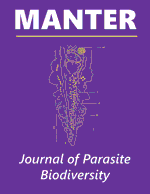Parasitology, Harold W. Manter Laboratory of

MANTER: Journal of Parasite Biodiversity
ORCID IDs
Agosta https://orcid.org/0000-0003-1874-5572
Boeger https://orcid.org/0000-0002-6004-2822
Brooks https://orcid.org/0000-0002-7891-9821
Colella https://orcid.org/0000-0003-2463-1029
Cook https://orcid.org/0000-0003-3985-0670
Dunnum https://orcid.org/0000-0001-7868-3719
Hoberg https://orcid.org/0000-0003-0819-7437
Trivellone https://orcid.org/0000-0003-1415-4097
Date of this Version
12-21-2022
Document Type
Article
Citation
MANTER: Journal of Parasite Biodiversity (December 21, 2022) number 26
doi: 10.32873/unl.dc.manter26
Abstract
One Health programs and trajectories are now the apparent standard for exploring the occurrence and distribution of emerging pathogens and disease. By definition, One Health has been characterized as a broadly inclusive, collaborative, and transdisciplinary approach with connectivity across local to global scales, which integrates the medical and veterinary community to recognize health outcomes emerging at the environmental nexus for people, animals, plants, and their shared landscapes. One Health has been an incomplete model, conceptually and operationally, focused on reactive and response-based foundations, to limit the impact of emerging pathogens and emerging infectious diseases and, as such, lacks a powerful proactive capacity. A proactive, predictive One Health is necessary, emanating in part from geographically/taxonomically broad and temporally deep biological collections of pathogen-host assemblages. The DAMA protocol (Document, Assess, Monitor, Act), the operational extension of the Stockholm paradigm (SP), accomplishes this task by encompassing holistic and strategic biological sampling of reservoir host assemblages and pathogens at environmental interfaces and more extensively through resurveys, with development of informatics resources digitally linked to physical specimens held in publicly accessible museum biorepositories. Archives of specimens are the foundations for accumulating interrelated archives of information (the baselines against which change can be identified and tracked), with collections serving as fundamental resources for biodiversity informatics under the conceptual evolutionary and ecological umbrella of the SP. A cultural and conceptual transformation is essential among the diverse practitioners in the One Health community, one that recognizes the necessity of placing pathogens in an evolutionary, ecological, and environmental context by integrating specimens and associated informatics into an infrastructure and networks for actionable information. As a community, it is essential to abandon response-based business as usual while looking forward toward proactive transboundary approaches that maximize our conceptual and taxonomic view of diversity across interconnected planetary scales that influence the complexity of pathogen-host interfaces. Evolution, where the past always influences the present and the future, defines our trajectory, as the need for sustained archives that describe the biosphere becomes more acute with each passing day.


Comments
Copyright © 2022, Hoberg, Trivellone, Cook, Dunnum, Boeger, Brooks, Agosta, and Colella
License: CC BY-NC-SA 4.0 International